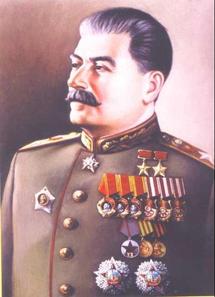
He said during a visit to the museum that it would in future "commemorate victims of Stalinism" and that in its current form it was "incompatible" with present-day Georgia and its future.
"Such a museum cannot exist in a country which is still confronting the vestiges of the Soviet empire," he said in apparent reference to Georgia's strained relations with its former imperial master and their brief war in 2008 over the Kremlin-backed separatist region of South Ossetia.
"History cannot be erased and this very difficult page in our country's history must be adequately displayed within these walls," he said.
The Gori museum was opened in 1937 in a small brick hut where the Soviet dictator was born.
In 1957, a grand granite and marble structure was constructed nearby to house an exhibition aimed at chronicling and glorifying Stalin's life.
In 2010, keen to erase Soviet legacy, Georgia's fervently pro-Western government removed a huge bronze statue of Stalin which had stood in Gori's main square since 1952.
It will be replaced with a monument to those killed by the Soviet dictator and to victims of the Russia-Georgia war.
A law was adopted last year banning the public display of Soviet symbols and prohibiting former Communist and KGB officials from holding public office.
An annual "Soviet Occupation Day" was also launched -- a commemoration of the Red Army invasion in 1921 which forced independent Georgia into the USSR.
Born Joseph Dzhugashvili in Gori in 1878, Stalin ruled the Soviet Union with an iron fist from the late 1920s until his death in 1953.
He is accused by historians of causing the deaths of millions of Soviet citizens in brutal Gulag prison camps and through the forced collectivisation of agriculture.
However, there are still relatively few memorials in the former Soviet Union and particularly Russia to the victims of the horrific repression carried out by the Stalin regime.
Carrying red flags, bouquets of flowers and a framed portrait of their idol, dozens of elderly communists gather near the museum every year to celebrate Stalin's birthday.
But Georgia's few communists retain no political influence or popular support in the country today.
The government's drive to break with its Soviet past has infuriated the Kremlin, prompting president-elect Vladimir Putin to once accuse Georgia of trying to erase from the collective memory of the people of the former Soviet Union "their common past and their heroic history".
----------------------------------------------------------------------------------
"Such a museum cannot exist in a country which is still confronting the vestiges of the Soviet empire," he said in apparent reference to Georgia's strained relations with its former imperial master and their brief war in 2008 over the Kremlin-backed separatist region of South Ossetia.
"History cannot be erased and this very difficult page in our country's history must be adequately displayed within these walls," he said.
The Gori museum was opened in 1937 in a small brick hut where the Soviet dictator was born.
In 1957, a grand granite and marble structure was constructed nearby to house an exhibition aimed at chronicling and glorifying Stalin's life.
In 2010, keen to erase Soviet legacy, Georgia's fervently pro-Western government removed a huge bronze statue of Stalin which had stood in Gori's main square since 1952.
It will be replaced with a monument to those killed by the Soviet dictator and to victims of the Russia-Georgia war.
A law was adopted last year banning the public display of Soviet symbols and prohibiting former Communist and KGB officials from holding public office.
An annual "Soviet Occupation Day" was also launched -- a commemoration of the Red Army invasion in 1921 which forced independent Georgia into the USSR.
Born Joseph Dzhugashvili in Gori in 1878, Stalin ruled the Soviet Union with an iron fist from the late 1920s until his death in 1953.
He is accused by historians of causing the deaths of millions of Soviet citizens in brutal Gulag prison camps and through the forced collectivisation of agriculture.
However, there are still relatively few memorials in the former Soviet Union and particularly Russia to the victims of the horrific repression carried out by the Stalin regime.
Carrying red flags, bouquets of flowers and a framed portrait of their idol, dozens of elderly communists gather near the museum every year to celebrate Stalin's birthday.
But Georgia's few communists retain no political influence or popular support in the country today.
The government's drive to break with its Soviet past has infuriated the Kremlin, prompting president-elect Vladimir Putin to once accuse Georgia of trying to erase from the collective memory of the people of the former Soviet Union "their common past and their heroic history".
----------------------------------------------------------------------------------









 Home
Home Politics
Politics









